takeplace,happen,occur,comeabout,breakout用法辨析
英语中的“发生”happen, occur ,take place,和break out的区别

英语中的“发生”happen,occur ,take place,和break out的区别take place和happen 的区别:(1)、发生的性质不同take place常指按计划“发生”happen往往表示事情的发生带有偶然性, happen是一般用语(2)、主语的条件不同happen常指具体事件的发生,特别指那些偶然的或未能预见的“发生”。
break out 爆发,发生(战争,战斗;意想不到的事情)=occur suddenly爆发;(突然)发生come about表示“发生、产生",多指事情已经发生了,但还不知道为什么,常用于疑问句和否定句(3)、搭配不同take place表示“发生”,可与happen 换用,但其后面一般不接to sb./sth.结构。
break out 爆发,发生=occur suddenly爆发;(4)、occur常用句型It occurs to sb. that 某人突然想起……具体应用1.take place 发生,举行;take place of 代替(1)、She wanted Hugh's wedding to take place quickly她希望休快点举行婚礼。
(2)、This year's event will take place on June 19th, a week earlierthan usual今年的活动将于6月19日举行,比往年提前一周。
(3)、Earlier reports suggested that a meeting would take place on Sunday早先的报道暗示周日可能会召开会议。
(4)、The meeting will take place as planned.会议将按预定的计划进行。
(5)、I'll take place of my father for a while.我将暂时代替我父亲。
happen,occur和takeplace区别

happen,occur和takeplace区别
均为不及物动词
happen指“偶然发⽣”时,主语为“事”;
occur指“发⽣”时可与happen 换⽤,但后接to sb./sth.时,两者含义不同:happen to sb./sth.,主语为⼈时,译为“碰巧”;多指不好的事情发⽣在某⼈(物)⾝上;occur to sb./sth.指“某种思想等呈现于某⼈的知觉中”。
take place 表⽰“发⽣”,可与 happen 或occur换⽤,但其后⾯⼀般不接 to sb./sth.结构;指必然会发⽣的事情时,多⽤take place;此外take place 还可表⽰“举⾏某种活动”。
He happened to know the place.他碰巧知道那个地⽅。
(主语为“他”,⼈作主语)
When did the earthquake occur/happen?地震是什么时候发⽣的?
Didn’t it occur to you to phone them about it?你难道就没想过给他们打个电话?(思想)
Has anything happened to him?他出什么事了吗?(不好)
In 1919, the May 4th Movement took place in China.⼀九⼀九年,中国发⽣了五四运动。
take place, happen, occur, come about, break out用法辨析
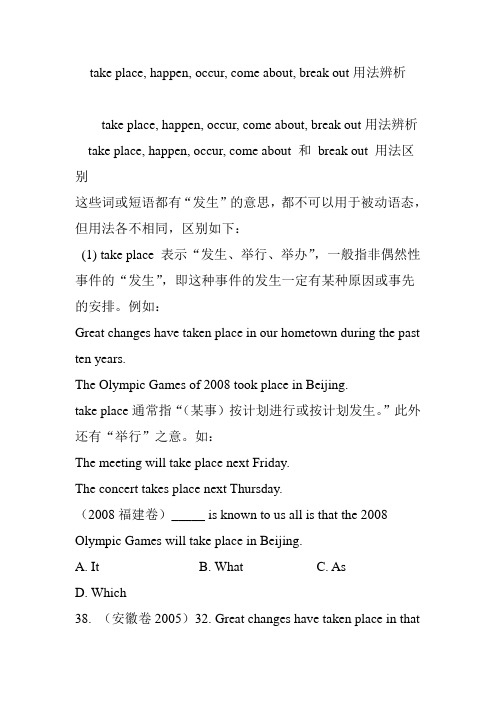
take place, happen, occur, come about, break out用法辨析take place, happen, occur, come about, break out用法辨析take place, happen, occur, come about 和break out 用法区别这些词或短语都有“发生”的意思,都不可以用于被动语态,但用法各不相同,区别如下:(1) take place 表示“发生、举行、举办”,一般指非偶然性事件的“发生”,即这种事件的发生一定有某种原因或事先的安排。
例如:Great changes have taken place in our hometown during the past ten years.The Olympic Games of 2008 took place in Beijing.take place通常指“(某事)按计划进行或按计划发生。
”此外还有“举行”之意。
如:The meeting will take place next Friday.The concert takes place next Thursday.(2008福建卷)_____ is known to us all is that the 2008 Olympic Games will take place in Beijing.A. ItB. WhatC. AsD. Which38. (安徽卷2005)32. Great changes have taken place in thatschool. It is no longer ______ it was 20 years ago, _____ it was so poorly equipped./A. what; when B. that; which C. what; which D. which; that (名词)(2) happen 作“发生、碰巧”解,常指具体事件的发生,特别指那些偶然的或未能预见的“发生”,一般用于偶然或突发性事件。
take place,happen,occur,come about,break out

9, 我没有想到汤姆会被选为学生会主席。(occur) (1)It never occurred that Tom would / should be elected/ made chairman of the students’ Union.
(2)It didn’t occur to me that Tom would / should be elected/ made chairman of the students’ Union. 10,I____along the street looking for a place to park when the accident . A.went; was occurring B.went; occurred C.was going; occurred D.was going; had occurred
longer __it was 20 years ago, __it was so poorly equipped.
ቤተ መጻሕፍቲ ባይዱ
A.what;when B.that;which C.what;which D.which;that
5,The computer system _____suddenly while he was searching for information on the Internet. A.broke down B. broke out C. broke up D. broke in
(2) happen 作“发生、碰巧”解,常指具体事件 的发生,特别指那些偶然的或未能预见的“发生”, 一般用于偶然或突发性事件。例如:
A storm happened across the river in another country.
英语写作系列之五:主语做什么时,谓语动词可能用的四种方式

英语写作系列之五:主语做什么时,谓语动词可能用的四种方式1. 主语+ V iWe work.We study.常考的不及物动词有:happen(发生), take place发生,举行), break out(突然发生,爆发,)occur(发生), accur(发生)come about (发生), remain(仍然), stay(呆),exist (存在), live(生活,居住), work(工作), go(去), come(来), graduate(毕业), burst (爆裂;爆发),belong(属于)compete (竞赛)arise(出现,发生)appear(出现),rise(上升)apologize (to sb for sth)(道歉), react(反应react to sb/sb对……作出反应),dive (跳水,潜水)participate(参加,participate in = take part in ), boom (处于经济发展时期),differ(不同,相异),lie(位于,说谎)hesitate(犹豫)give in(屈服give in to sb/sth),2. 主语+ Vt +宾语We study English.常考的只能作及物动词的词有:lose(使失去) seat (使入座)3. 主语+ Vt + 间接宾语+ 直接宾语He gave me some ink. ( He gave some ink to me)My father bought me a pen ( My father bought a pen for me)4. 主语+ Vt + 宾语+宾语补足语Li Ping made the baby laugh.I want you to finish the task.I had my house repairedI saw him singing an English song.译:1,他们大笑了2,我买了一部新自行车3,她告诉了我一个故事4,他使得我很五种简单句及there be 句型1. 主语+ V iWe work.We study.2. 主语+ Vt +宾语We study English.3. 主语+ 连系动词+ 表语They are students.The story sounds interesting.4. 主语+ Vt + 间接宾语+ 直接宾语He gave me some ink. ( He gave some ink to me)My father bought me a pen ( My father bought a pen for me)5. 主语+ Vt + 宾语+宾语补足语Li Ping made the baby laugh.I want you to finish the task.I had my house repairedI saw him singing an English song.6. There be句型There is a car.There are many trees.There is a pen, two books and a bottle of ink in the room.I ‖bought a new bike.She‖told me a story. He‖made me happy.。
take place的同义词组

take place的同义词组“Take place” 同义词组可以有很多,这里列举几个常用的同义词组:1. Occur: 发生、出现。
Occur 是 take place 的一个常见同义词,表示“发生或出现”的意思。
例如:The accident occurred on a busy street.2. Happen: 发生、出现。
Happen 是 take place 的另一个常见同义词,表示“发生或出现”的意思。
例如:The meeting happened last week.3. Transpire: 发生、出现。
Transpire 是 take place 的另一个更少见的同义词,表示“发生或出现”的意思。
例如:Strange things transpired during the night.4. Take effect: 生效、实施。
Take effect 是take place 的另一个同义词,表示“生效或实施”的意思。
例如:The new regulations will take effect next month.5. Be held: 举行、举办。
Be held 是 take place 的另一个同义词,表示“举行或举办”的意思。
例如:The conference will be held in New York.6. Come about: 发生、传出。
Come about 是 take place 的另一个同义词,表示“发生或传出”的意思。
例如:Rumors came about that the company was going bankrupt.7. Occasion: 举行、举办。
Occasion 是 take place 的另一个同义词,表示“举行或举办”的意思。
例如:We are planning to have an occasion for my father's birthday.8. Arise: 出现、发生。
take place, happen, occur, come about和break out用法区别

take place, happen, occur, come about和break out用法区别这些词或短语都有“发生”的意思,但用法各不相同,区别如下:(1). take place 表示“发生、举行、举办”,一般指非偶然性事件的“发生”,即这种事件的发生一定有某种原因或事先的安排,例如:Great changes have taken place in our hometown during the past ten years.The Olympic Games of 2008 will take place in Beijing.(2) .happen作“发生、碰巧”解,一般用于偶然或突发性事件,例如:What happened to you? (一般不说:What did you happen?)Maybe something unexpected happened.I happened to see him on my way home.= It happened that I saw him on my way home.(3). occur作“发生、想到、突然想起”解,其意义相当于happen,例如:What has occurred? (=What has happened?)A big earthquake occurred (=happened) in the south of China last month.It occurred to me that she didn’t know I had moved into the new house.(4). come about表示“发生、产生”,多指事情已经发生了,但还不知道为什么,常用于疑问句和否定句,例如:When Mother woke up, she didn’t know what had come about.I’ll never understand how it came about that you were late three times a week.Do you know how the air accident came about?(5). break out意思为“发生、爆发”,常指战争、灾难、疾病或者争吵等事件的发生,也可以表示突然大声叫喊等,例如:Two world wars broke out last century.A fire broke out in the hospital in the mid-night.After the flood, diseases broke out here and there.She broke out, “That is too unfair!”occur vi. 1发生2 想起,想到常用搭配:sth. occurs to sb.:某人突然想起某事;It never occurred to sb. that…:某人从未想到……More people are afraid to take planes because several air crashes have occurred this month. Suddenly a good idea occurred to her.It never occurred to us that the well-dressed man was a pickpocket.我们决没有想到,那个衣冠楚楚的人是个扒手。
takeplace,happen,occur,comeabout,breakout用法辨析.doc
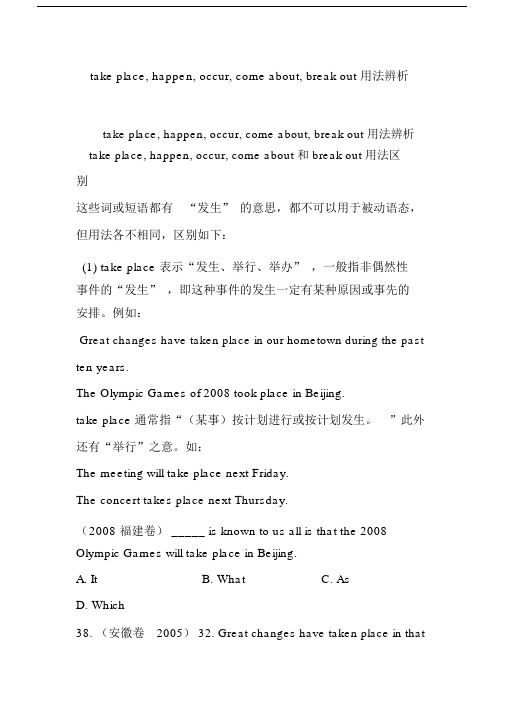
take place, happen, occur, come about, break out 用法辨析take place, happen, occur, come about, break out 用法辨析take place, happen, occur, come about 和 break out 用法区别这些词或短语都有“发生”的意思,都不可以用于被动语态,但用法各不相同,区别如下:(1)take place 表示“发生、举行、举办” ,一般指非偶然性事件的“发生” ,即这种事件的发生一定有某种原因或事先的安排。
例如:Great changes have taken place in our hometown during the past ten years.The Olympic Games of 2008 took place in Beijing.take place 通常指“(某事)按计划进行或按计划发生。
”此外还有“举行”之意。
如:The meeting will take place next Friday.The concert takes place next Thursday.(2008 福建卷) _____ is known to us all is that the 2008 Olympic Games will take place in Beijing.A. ItB. WhatC. AsD. Which38. (安徽卷2005) 32. Great changes have taken place in thatschool. It is no longer ______ it was 20 years ago, _____ it was so poorly equipped./A. what; when B. that; which C. what; which D. which; that(名词)(2)happen 作“发生、碰巧”解,常指具体事件的发生,特别指那些偶然的或未能预见的“发生” ,一般用于偶然或突发性事件。
takeplace,happen,occur,comeabout和breakout用法区别

take place, happen, occur, come about和break out用法区别这些词或短语都有“发生”的意思,但用法各不相同,区别如下:(1). take place 表示“发生、举行、举办”,一般指非偶然性事件的“发生”,即这种事件的发生一定有某种原因或事先的安排,例如:Great changes have taken place in our hometown during the past ten years.The Olympic Games of 2008 will take place in Beijing.(2) .happen作“发生、碰巧”解,一般用于偶然或突发性事件,例如:What happened to you (一般不说:What did you happen)Maybe something unexpected happened.I happened to see him on my way home.= It happened that I saw him on my way home.(3). occur作“发生、想到、突然想起”解,其意义相当于happen,例如:What has occurred (=What has happened)A big earthquake occurred (=happened) in the south of China last month.It occurred to me that she didn’t know I had moved into the new house.(4). come about表示“发生、产生”,多指事情已经发生了,但还不知道为什么,常用于疑问句和否定句,例如:When Mother woke up, she didn’t know what had come about.I’ll never understand how it came about that you were late three times a week.Do you know how the air accident came about(5). break out意思为“发生、爆发”,常指战争、灾难、疾病或者争吵等事件的发生,也可以表示突然大声叫喊等,例如:Two world wars broke out last century.A fire broke out in the hospital in the mid-night.After the flood, diseases broke out here and there.She broke out, “That is too unfair!”occur vi. 1发生2 想起,想到常用搭配:sth. occurs to sb.:某人突然想起某事;It never occurred to sb. that…:某人从未想到……More people are afraid to take planes because several air crashes have occurred this month. Suddenly a good idea occurred to her.It never occurred to us that the well-dressed man was a pickpocket.我们决没有想到,那个衣冠楚楚的人是个扒手。
五种“发生”,各有不同-英语

Step 1.Observation
The accidenthappenedearly this morning.
Many accidentsoccurin the home.
The contesttakes placeevery four years.
The First World Warbroke outin 1914.
I don’t know how thiscame about.
What do they have in common?不及物动词,无被动语态
Step 2.Finding out the differences
1.Happen & occur
Happen与occur都表示“偶然发生”,一般用于偶然或突发性事件。
二、教学对象分析
高一年级的学生已经学过了这几个词的用法,但是在使用过程中总是出错。
对于大部分学生来说,这几个词的用法和区别是个学习的难点。因此,通过本节课的讲解和归纳,希望学生能够加深对这几个词的认识,在实际应用中能比较准确地使用这些词。
三、教学目标
学生能够认识到高中英语中表示“发生”的词,happen, occur, takeplace, break
Since the 2012 Olympic Games __________in London,great changes have ____________ there. For example, fewer and fewer traffic accidents__________________and nearly no quarrels ____________. You may wonder
I happened to see him on my way home. =
英语核心词汇详解happen, take place, occur辨析

英语核心词汇详解happen, take place, occur辨析happen, take place与occurhappen是不及物动词,作“发生”解时,可指偶然的事故,多用于客观事物情况的发生,也可指有计划或无计划发生的事。
一般以事件、环境、形势等作主语,表示“某人发生某事”时,须以介词to引出“某人”。
如:The accident happened at 5 o'clock. 事故发生在五点钟。
Whatever has happened to your arm? It’s all swollen。
你的手臂怎么了?肿得好厉害。
occur 基本意思是“呈现在视野、思想、意识中”,指有计划地使某些事“发生”,有时强调“呈现”于人的知觉中。
occur常与介词to连用,意为“发生”“想起”等。
occur一般只用作不及物动词,含有“出乎意料”的意味,不可用于表达意料之中或计划之中的事情,也不与suddenly连用。
Did it occur to you to phone them about it?你难道没想到就这事给他们打个电话?当具体事物、事件作主语时,happen和occur可以通用。
如:The accident happened/occurred yesterday。
事故是昨天发生的。
The earthquake occurred/happened at dawn.地震发生在黎明时分。
take place 指事件发生,但常用来表示“举行”的意思,带有非偶然性,其后面一般不跟to sb./sth.指必然会发生的事情时,多用take place.例如:The meeting took place last night. 会议昨晚举行。
Great changes have taken place in China.中国发生了翻天覆地的变化。
引导时间状语从句的连词:when, while, as, before, after, until, till, as soon as, since等。
come about,happen,take place,break out,occur
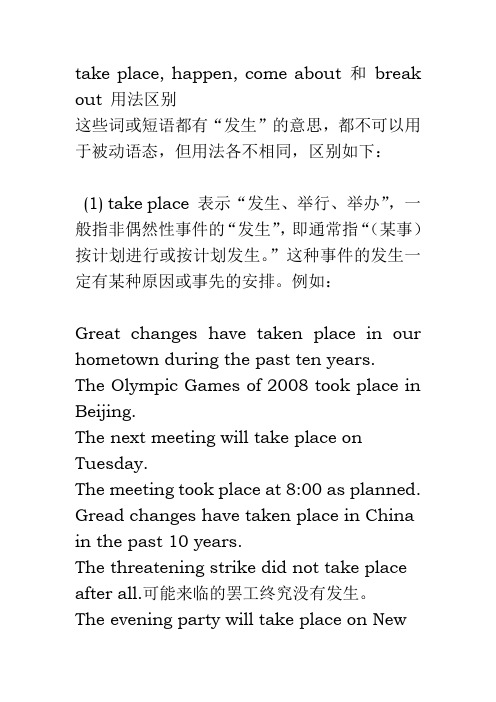
take place, happen, come about 和break out 用法区别这些词或短语都有“发生”的意思,都不可以用于被动语态,但用法各不相同,区别如下:(1) take place 表示“发生、举行、举办”,一般指非偶然性事件的“发生”,即通常指“(某事)按计划进行或按计划发生。
”这种事件的发生一定有某种原因或事先的安排。
例如:Great changes have taken place in our hometown during the past ten years.The Olympic Games of 2008 took place in Beijing.The next meeting will take place on Tuesday.The meeting took place at 8:00 as planned. Gread changes have taken place in China in the past 10 years.The threatening strike did not take place after all.可能来临的罢工终究没有发生。
The evening party will take place on NewYear's Eve.晚会将在除夕那天举行。
When did this conversation take place?这次谈话是在什么时候?When does the draw take place? 抽奖什么时候举行?When will the marriage take place? 婚礼什么时候举行?A singing meet will take place next week. 下周将举行歌咏会。
It is not certain when it will take place. 不能确定这事什么时候会发生。
人教版高中英语必修3 第一单元unit1单词讲解
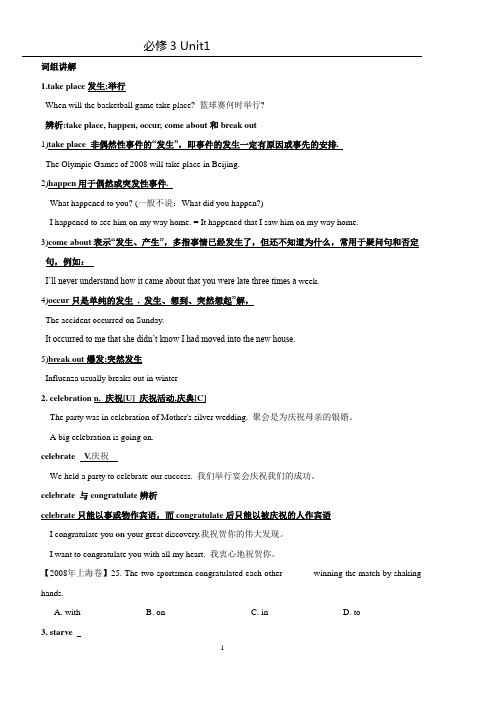
词组讲解1.take place发生;举行When will the basketball game take place? 篮球赛何时举行?辨析:take place, happen, occur, come about和break out1)take place 非偶然性事件的“发生”,即事件的发生一定有原因或事先的安排.The Olympic Games of 2008 will take place in Beijing.2)happen用于偶然或突发性事件.What happened to you? (一般不说:What did you happen?)I happened to see him on my way home. = It happened that I saw him on my way home.3)come about表示“发生、产生”,多指事情已经发生了,但还不知道为什么,常用于疑问句和否定句,例如:I’ll never understand how it came about that you were late three times a week.4)occur只是单纯的发生, 发生、想到、突然想起”解,The accident occurred on Sunday.It occurred to me that she didn’t know I had moved into the new house.5)break out爆发;突然发生Influenza usually breaks out in winter2. celebration n. 庆祝[U] 庆祝活动,庆典[C]The party was in celebration of Mother's silver wedding. 聚会是为庆祝母亲的银婚。
A big celebration is going on.celebrate V.庆祝We held a party to celebrate our success. 我们举行宴会庆祝我们的成功。
take place, happen, occur, come about和break out的区别

温馨提示:Sth. occur to sb./ it occur to sb. that…“某人突然想起…”
take place, happen, occur, come about和break out的区别
come about 表示“发生、产生”,多指事情已经发生了, 但还不知道为什么,常用于疑问句和否定句。
A. broke out B. put out C. came out D. got out 06广 东
C 9. It's already 10 o'clock I wonder how it ____ that she was two hours late on such a short trip.
此外还有“碰巧”之意。 I happened to see him on my way home. = It happened that I saw him on my way home. = It happened that I saw him on my way home.
take place, happen, occur, come about和break out的区别
take place, happen, occur, come about和break out的区别
happen 作“发生”解,常指具体事件的发生, 特别指那些偶然的或未能预见的“发生”,一般 用于偶然或突发性事件。
A storm happened across the river in another country.
D 4. ---Tom is never late for work. Why is he absent today?
必修2unit1单词讲解
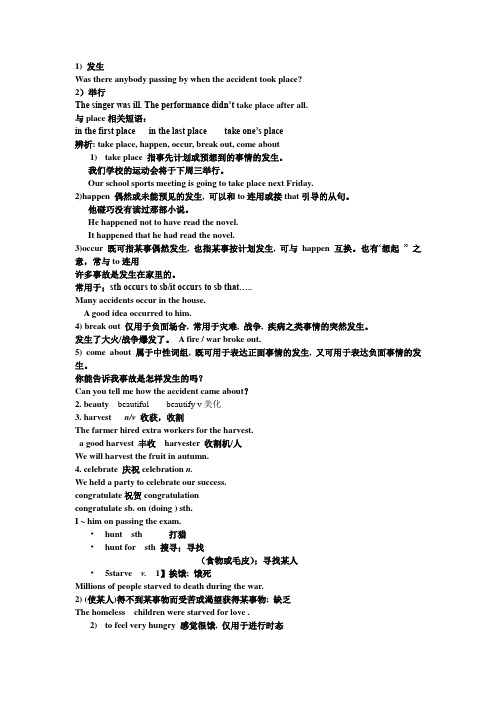
1) 发生Was there anybody passing by when the accident took place?2)举行The singer was ill. The performance didn‟t take place after all.与place相关短语:in the first place in the last place take one‟s place辨析: take place, happen, occur, break out, come about1)take place 指事先计划或预想到的事情的发生。
我们学校的运动会将于下周三举行。
Our school sports meeting is going to take place next Friday.2)happen 偶然或未能预见的发生, 可以和to连用或接that引导的从句。
他碰巧没有读过那部小说。
He happened not to have read the novel.It happened that he had read the novel.3)occur 既可指某事偶然发生, 也指某事按计划发生, 可与happen互换。
也有…想起” 之意,常与to连用许多事故是发生在家里的。
常用于;sth occurs to sb/it occurs to sb that…..Many accidents occur in the house.A good idea occurred to him.4) break out 仅用于负面场合, 常用于灾难, 战争, 疾病之类事情的突然发生。
发生了大火/战争爆发了。
A fire / war broke out.5) come about 属于中性词组, 既可用于表达正面事情的发生, 又可用于表达负面事情的发生。
你能告诉我事故是怎样发生的吗?Can you tell me how the accident came about?2. beauty beautiful beautify v美化3. harvest n/v 收获,收割The farmer hired extra workers for the harvest.a good harvest 丰收harvester 收割机/人We will harvest the fruit in autumn.4. celebrate 庆祝celebration n.We held a party to celebrate our success.congratulate祝贺congratulationcongratulate sb. on (doing ) sth.I ~ him on passing the exam.•hunt sth 打猎•hunt for sth 搜寻;寻找(食物或毛皮);寻找某人•5starve v.1】挨饿; 饿死Millions of people starved to death during the war.2) (使某人)得不到某事物而受苦或渴望获得某事物; 缺乏The homeless children were starved for love .2)to feel very hungry 感觉很饿, 仅用于进行时态3)When will dinner be ready? I‟m sta rving. starvation n. [U] 饿死die of starvationstarvation wages 不够维持基本生活的工资6. origin 起源,由来,起因What was the origin of the accident?The origins of life on earth可用做可数名词或不可数名词, 通常用作复数形式original adj. 原始的7. religious religion n.1)宗教上的,信奉宗教的Most western people have religious beliefs.2) 虔诚的She is a very religious person.8. in memory of 纪念The museum was built in memory of thefamous scientist.in honor of 纪念in praise of 表扬in celebration of 庆祝in search of 寻找in need of 需要in favour of 喜欢支持in charge of 控制管理负责9. belief 1)信任; 信心[U]I have strong belief in my future.2) 信仰[C]religious beliefs宗教信仰beyond belief难以置信believe v.10. dress up盛装,打扮You should dress up when you take part in the party. dress 给…穿衣服dress sb./oneselfWake up children and dress them.Hurry up and get dressed. (动态)The girl was dressed in red. (静态)11. trick1)n. 诡计,花招They had to think of a trick to get passed the guards. do/perform a trick 玩把戏2) n. 窍门,招数Daily practice is the trick in learning a foreign language.3)vt. 欺骗,诈骗She tricked the SnowWhite into eating the poisoned apple. The man tricked the old woman out of all her money.trick sb into sth/doing sth 诱骗某人做某事trick sb. out of sth 诱骗某人某物12. play a trick/tricks on…捉弄… 戏弄….The naughty boy loves playing tricks on others.13. poet诗人Li Bai is a great poet who wrote many famous poems.14.arrival1)到达,到来The arrival of the train is 9:00.On our arrival at the farm, we were welcomed by the farmers.2) 到达者They went out to welcome the new arrivals.a new arrival=a babyarrive v15. gain1)获得He gained full marks in the exam.2) 赢得The scientist gained the respect of his students.No pains, no gains.16. independence独立,自主India gained independence from Britain in 1947.depend vdependent adjindependent adj 独立的,自主的be dependent on/upon 依靠be independent of 不受…支配的不依赖的17. gather1)搜集The writer is gathering materials for his works.2)集合The teacher gathered the students around her.3) 聚集The clouds are gathering.【辨析】collect 指有计划, 有选择地收集。
(完整版)takeplace,happen,occur,comeabout和breakout的区别
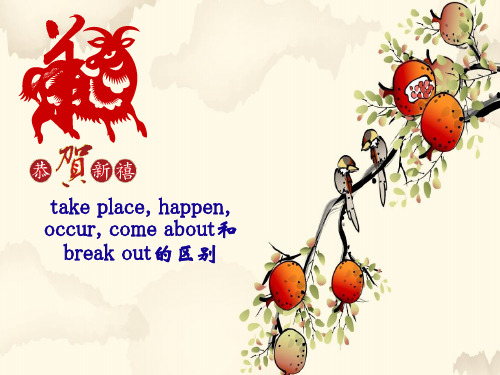
C 6. I _____ along the street looking for a place to park when the accident _______ .
A. went; was occurring B. went; occurred C. was going; occurred D. was going; had occurred 06
take place, happen, occur, come about和break out的区别
break out 意思为“发生、爆发”,常指战争、灾 难、疾病或者争吵等事件的发生。
A fire broke out in the hospital in the mid-night. After the flood, diseases broke out here and there.
When Mother woke up, she didn't know what had come about.
I'll never understand how it came about that you were late three times a week.
Do you know how the air accident came about?
take place, happen, occur, come about和break out的区别
happen 作“发生”解,常指具体事件的发生, 特别指那些偶然的或未能预见的“发生”,一般 用于偶然或突发性事件。
A storm happened across the river in another country.
此外还有“碰巧”之意。 I happened to see him on my way home. = It happened that I saw him on my way hoon my way home.
人教版高中英语必修3unit1单词

5.starve v.
1) 挨饿; 饿死
Millions of people starved to death during the war.
2) (使某人)得不到某事物而受苦或渴望获得某事物; 缺乏
The homeless children were starved for love . 3) to feel very hungry 感觉很饿, 仅用于进行时态 When will dinner be ready? I’m starving. starvation n. [U] 饿死 die of starvation starvation wages 不够维持基本生活的工资
发生。
你能告诉我事故是怎样发生的吗?
Can you tell me how the accident came about?
运用 用上述表示“发生”的词或词组填空。
⑴ Great changes _______________ have taken place in our hometown in the past decade.
__________ believable
n. 信任; 信心; 信仰
adj. 可信的 adj. 难以置信的
__________________ unbelievable=incredible
点拨: 类似的词还有: relieve/relief, grieve/ grief等。
10. dress up 盛装,打扮 You should dress up when you take part in the party. dress 给…穿衣服 dress sb./oneself Wake up children and dress them. Hurry up and get dressed. (动态)
发生的相关英语短语

发生的相关英语短语只要活着,一定会有什么好事发生的。
下面就由店铺为大家带来关于发生的英语短语集锦,希望大家能有所收获。
关于发生的相关短语发生故障 break down突然发生 strike ; break out关于发生的相关单词happen;occur;germination;occurrence;arises关于发生的词语辨析take place, chance, happen, occur这组词都有“发生”的意思,其区别是:take place 多指通过人为安排的发生。
chance 侧重事前无安排或无准备而发生的事,特指巧合。
happen 普通用词,泛指一切客观事物或情况的发生,强调动作的偶然性。
occur 较正式用词,可指意外地发生,也可指意料中的发生。
关于发生的相关短句或解释1.happen; occur; take place; arise; crop up; chance; befall; come off; come to pass; come about; come up; come what may; be set; turn up; bring to pass:Problems arose.发生问题。
Something unexpected happened.发生了意外。
Conflicts occurred.发生冲突。
What has happened?; What's the matter?; What has occurred?; What took place?; What has come about?; Has something come up?; What's up with (sb. and sth.)?发生了什么事?The machine broke down.机器发生故障。
A violent earthquake occurred there.那里发生了强烈地震。
- 1、下载文档前请自行甄别文档内容的完整性,平台不提供额外的编辑、内容补充、找答案等附加服务。
- 2、"仅部分预览"的文档,不可在线预览部分如存在完整性等问题,可反馈申请退款(可完整预览的文档不适用该条件!)。
- 3、如文档侵犯您的权益,请联系客服反馈,我们会尽快为您处理(人工客服工作时间:9:00-18:30)。
take place, happen, occur, come about, break out用法辨析
take place, happen, occur, come about, break out用法辨析take place, happen, occur, come about 和break out 用法区别
这些词或短语都有“发生”的意思,都不可以用于被动语态,但用法各不相同,区别如下:
(1) take place 表示“发生、举行、举办”,一般指非偶然性
事件的“发生”,即这种事件的发生一定有某种原因或事先
的安排。
例如:
Great changes have taken place in our hometown during the past ten years.
The Olympic Games of 2008 took place in Beijing.
take place通常指“(某事)按计划进行或按计划发生。
”此外还有“举行”之意。
如:
The meeting will take place next Friday.
The concert takes place next Thursday.
(2008福建卷)_____ is known to us all is that the 2008 Olympic Games will take place in Beijing.
A. It
B. What
C. As
D. Which
38. (安徽卷2005)32. Great changes have taken place in that
school. It is no longer ______ it was 20 years ago, _____ it was so poorly equipped.
/A. what; when B. that; which C. what; which D. which; that (名词)
(2) happen 作“发生、碰巧”解,常指具体事件的发生,特
别指那些偶然的或未能预见的“发生”,一般用于偶然或突
发性事件。
例如:
A storm happened across the river in another country.
What happened to you? (一般不说:What did you happen?) Maybe something unexpected happened.
New things are happening all around us.
I happened to see him on my way home.
= It happened that I saw him on my way home.
It happened that I had no money on me.
高考链接:(2008陕西)He was curious (好奇) to know what was happening in the office. (2008陕西)
高考链接:(江西卷2005)22.—Tom is never late for work. Why is he absent today?
—Something ________ to him.
A.must happen
B.should have happened
C.could have happened
D.must have happened
高考链接:(NMET2006.I) 31. Eliza remembers everything
exactly as if ______ yesterday.
A. was happening
B. happens
C. has happened
/D. happened
(3) occur 作“发生、想到、突然想起”解,其意义相当于
happen。
例如:
What has occurred? (= What has happened?)
A big earthquake occurred (= happened) in the south of
China last month.
It occurred to me that she didn't know I had moved into the
new house.
温馨提示:Sth. occur to sb./ it occur to sb. that…“某人突然想
起…”
高考链接:(2002.上海。
翻译)我没有想到汤姆会被选为学
生会主席。
(occur)
It never occurred/ didn’t occur to me that Tom would / should be elected/ made chairman of the students’ Union.
高考链接:(安徽2006)I along the street looking for
a place to park when the accident .
A.went; was occurring B.went; occurred
/C.was going; occurred D.was going; had occurred
高考链接:(上海2000) An awful accident ___, however, occur the other day.
A. does /
B. did
C. has to
D. had to
(4) come about 表示“发生、产生”,多指事情已经发生了,
但还不知道为什么,常用于疑问句和否定句。
例如:
When Mother woke up, she didn't know what had come about. I'll never understand how it came about that you were late three times a week.
Do you know how the air accident came about?
温馨提示:How did it come about that….?/ How come?“某事情是这样发生的,怎么会发生…样的事情?”
高考链接:(湖北2006) It's already 10 o'clock I wonder how it _______ that she was two hours late on such a short trip.
A. came over
B. came out /C: came about D. came up 高考链接:(江西卷2005)Please tell me how the accident
_______. I am still in the dark.
A.came by B.came upon
C.came to /D.came about
(5) break out 意思为“发生、爆发”,常指战争、灾难、疾病
或者争吵等事件的发生,也可以表示突然大声叫喊等。
例如:Two world wars broke out last century.
A fire broke out in the hospital in the mid-night.
After the flood, diseases broke out here and there.
She broke out, “That is too unfair!”
高考链接:(辽宁2006)The computer system
suddenly while he was searching for information on the Internet. /A. broke down B. broke out C. broke up D. broke in
高考链接:(广东2006) I was still sleeping when the
fire , and then it spread quickly.
/A. broke out B. put out C. came out D. got out。
